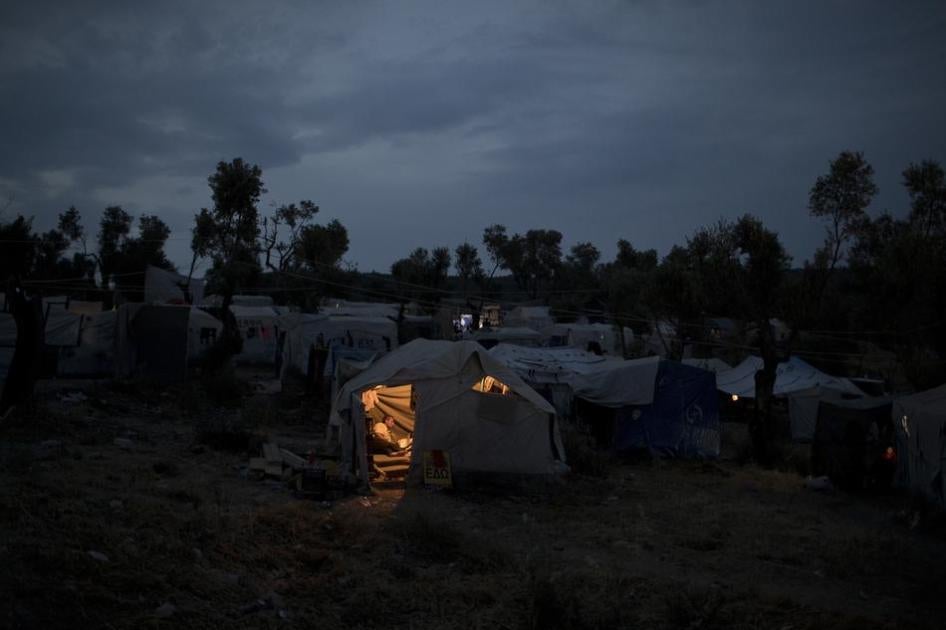The Greek islands are under the spotlight again, as a new wave of tragic events has hit asylum seekers trapped there. On 29 September, a big fire broke out in Moria - the notorious camp on the island of Lesbos - killing one woman, and injuring at least nine more people, including a baby, the health ministry reported.
On 24 September, a truck killed a five-year-old Afghan boy who was playing just outside Moria.
The number of asylum seekers crossing the Aegean from Turkey is also increasing.
With camps already overcrowded, conditions are horrific for asylum seekers and migrants trapped there. According to the government's most recent figures, 26,753 women, men and children live in camps designed for about 6,300.
The number has almost doubled since June.
But while the numbers have increased, neither the horrible conditions nor the flawed policies that cause them are new. Underinvestment, a poorly functioning asylum system, and a deliberate policy choice to confine asylum seekers to islands has left thousands trapped there for months or years in inhuman and degrading conditions.
Forcing migrants and asylum seekers to remain on the islands was ostensibly to expedite their return to Turkey under the March 2016 EU-Turkey deal.
But on 11 September, Gerald Knaus, head of a research organisation whose ideas inspired the EU-Turkey deal, wrote that: "The situation on Greek islands is unacceptable, the asylum system on the verge of collapse. This is a moment of truth."
This is indeed a moment of truth.
And the real challenge is not the number of arrivals by sea on the Greek Islands, but the unjustified suffering of thousands of people.
The crisis narrative leads only to security-driven responses that put asylum seekers' rights and dignity second.
The reality is that very few of those stuck on the islands have been returned to Turkey or to their countries of origin. Most can't be returned as Turkey is not a safe country for them.
And while Greek authorities have transferred some people to the mainland, they have refused to change the containment policy, even after a high court ruling.
Meanwhile, many people are sleeping in tents in makeshift camps around government-run facilities, or just out in the open.
They face severe unsanitary, unhygienic conditions, and don't have access to most basic services such as water and food. Medical care, trauma counselling, and mental health support are inadequate. Physical and gender-based violence are quite common.
Almost 1,300 unaccompanied migrant and asylum-seeking children are living in this insecure environment. Along with thousands of other school-age children, they are out of school, effectively denied education.
This has been going on for four years now.
Deliberate chaos
Aid groups say that about 7,000 people have received the green light to move to the mainland but transfers are extremely slow due to the lack of organisation, and of available accommodation.
But even when they are able to move, it won't solve the problem. The lack of a permanent relocation system for asylum seekers to other European countries as well as the long delays in processing family reunification requests only makes the situation worse.
The chaos on the Greek islands is not the evidence of Europe's inability to manage migration - but of its deliberate unwillingness to do so.
The Greek government needs to improve how it meets its legal obligation toward asylum seekers, including improving reception conditions and procedures.
It needs a long-term strategy that takes into account both the benefits of refugee integration and the needs of local host communities.
And European leaders need to take on their share of responsibility with a permanent system for receiving asylum seekers, processing their asylum applications and speeding family reunification to alleviate the burden on Greece.
Last week's discussion on the 'central Mediterranean route' in Malta should offer inspiration to Greece and EU leaders.
What Greece needs is for its new government to have the courage to say what everyone knows needs to happen, namely that the large-scale returns to Turkey are off the table, that the island containment policy is unsustainable and that the asylum system needs to be properly resourced.
And Greece also needs its fellow EU member states to work together to create a meaningful responsibility-sharing system to treat people with dignity and provide them with fair and efficient asylum procedures.










